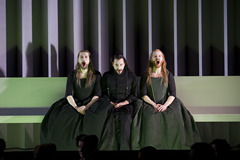| Opera Reviews | 25 April 2024 |
Unusual bedfellowsby Catriona Graham |
|
| Purcell: Dido and Aeneas Bartok: Bluebeard's Castle Oper Frankfurt Edinburgh International Festival August 2013 |
|
|
Purcell's short opera is performed in a tight space, with the cast sitting in a row on a bench the width of the stage, immediately in front of a concertina'd backdrop . Dido is in the centre, flanked by her handmaidens. The costumes are an eclectic mix of 17th century and modern. Dido is in pink, with huge side hoops. Some men are in knee breeches, others in trousers. There is a bare-breasted couple in Ascot hats, the point of which is obscure. Aeneas is in black slacks and deep-V cardigan over an open-necked shirt. Sebastian Geyer is hunky, and it is clear that, if Dido won't have him, be-flounced Second Woman Elizabeth Reiter will. She manages to get a paw on him during the orgiastic love-in when the principals get together. Much of the time the chorus are in the pit beside the orchestra, leaving the stage to Dido, Aeneas and the witches. The Sorceress and her witches - Martin Wölfel, Dmitry Egorov and Roland Schneider - sing their curses with relish. Wölfel also masquerades as Dido in a 'dream sequence' while Dido and Aeneas are parted by the plot. Geyer is an elegant Aeneas, convincingly caught between love and duty. Dido is sung by Paula Murrihy, her control contrasting with the enthusiasm of Reiter and of Kateryna Kasper as Belinda. Director Barrie Kosky has taken liberties and, after an exquisite Lament, the final chorus is punctuated by Murrihy's gasping, racking sobs. During the final dance, the chorus leaves the pit, with the orchestral players following, one by one, till only a single cello remains. It, too, breaks off, leaving Dido alone in her desolation. For Bluebeard's Castle, the curtain rises on a slowly revolving, raised white circle, which takes up the whole stage, revealing the ladders and doors normally behind flies and backdrops. Bluebeard (Robert Hayward) and Judith (Tanja Ariane Baumgarten) are in formal office wear - a black dress for her, blue grey suit and striped tie for him. This spare staging focuses our attention on the music and librettist Béla Bálazs's words. The original Barbe-bleu was - allegedly - 14th century Breton nobleman and serial killer Gilles de Rais. The libretto evokes Scott's Bride of Lammermuir, Young Lochinvar and Jock o' Hazeldean, all tales of women who lose their hearts to 'unsuitable' men against their families' wishes. Without a physical castle and doors to open, Judith's exploration of her sexuality is more apparent. Baumgarten's voice is rich and dark from the start, suggesting complicity in her eventual doom. Hayward is all power, but restrained - though I didn't quite get the point of his periodic fits of twitching and shaking, nor of massaging the area of his appendix. Both singers convey the tension and eroticism in Bartók's score, not least in their couplings. As doors are opened, non-singing men appear. Treasure is personified by a man dribbling gold dust through his fingers. For the garden of flowers, Judith pulls long tendrils from Bluebeard's tie and jacket sleeves. As the fifth door is opened, all four men are engulfed in jets of smoke or cloud. For the pool of tears, water drips from the men's jackets. Their fingers are red-tinged. Finally, the previous wives join the men in a clinch. The team of Kosky, designer Katrin Lea Tag and lighting Joachim Klein, chorus master Matthias Köhler and conuctor Constantinos Carydis have provided an unfussy, stylish and thought-provoking production allowing the music and libretti to speak for themselves. |
|
| Text ©
Catriona Graham Photo © Monika Rittershaus |

 Edinburgh's Festival Theatre is buzzing in the interval between Dido
and Aeneas and Bluebeard's Castle, Oper Frankfurt's double
bill.
Edinburgh's Festival Theatre is buzzing in the interval between Dido
and Aeneas and Bluebeard's Castle, Oper Frankfurt's double
bill. 





